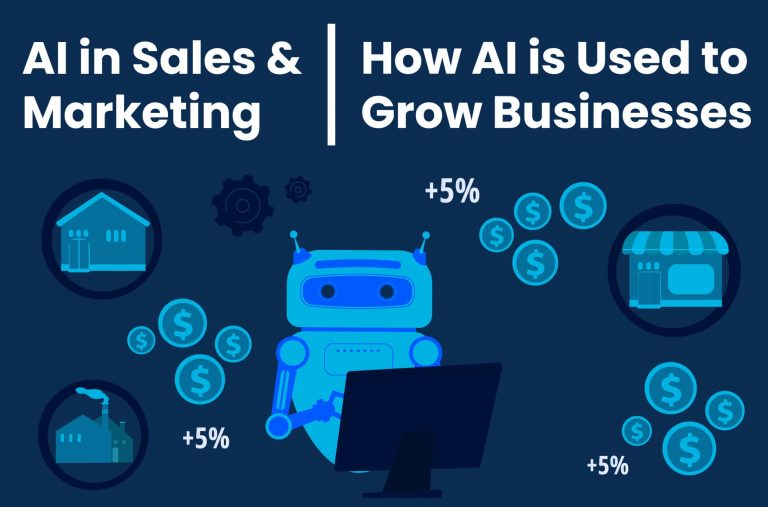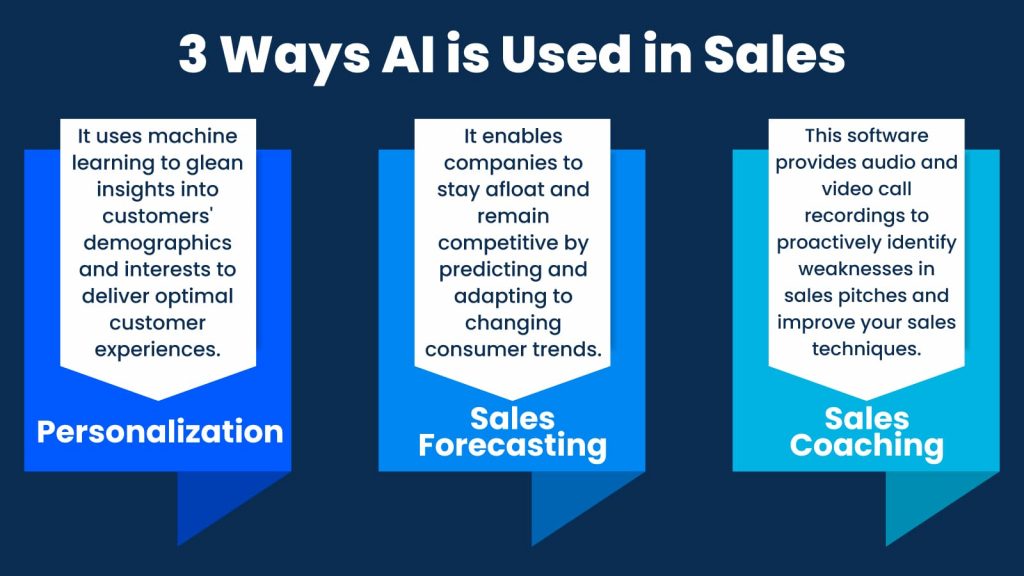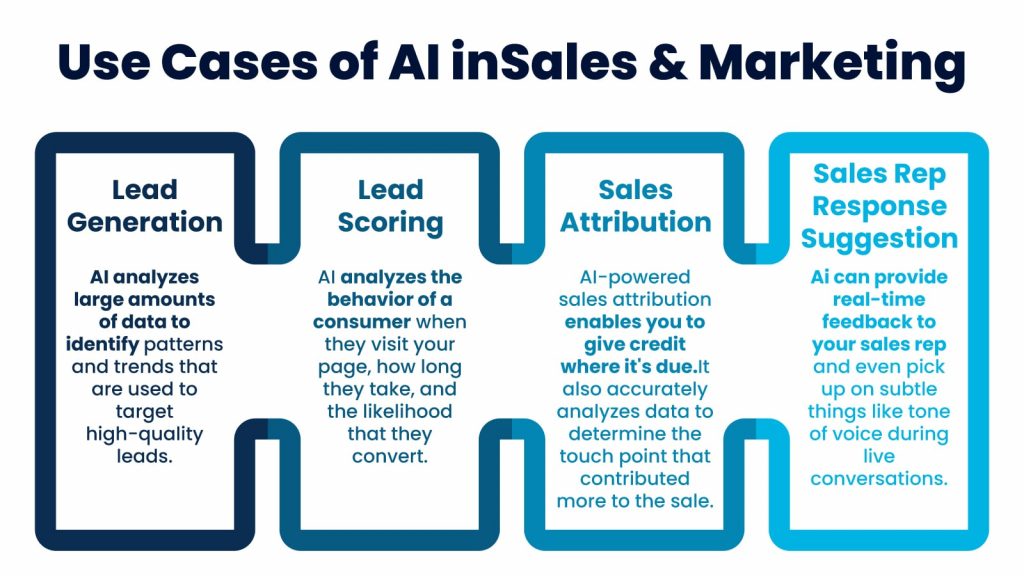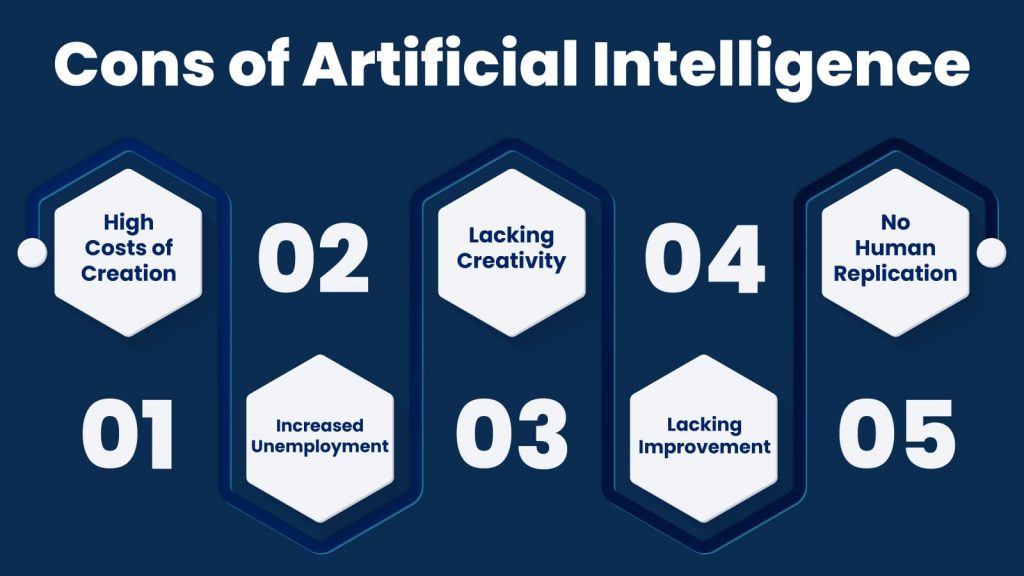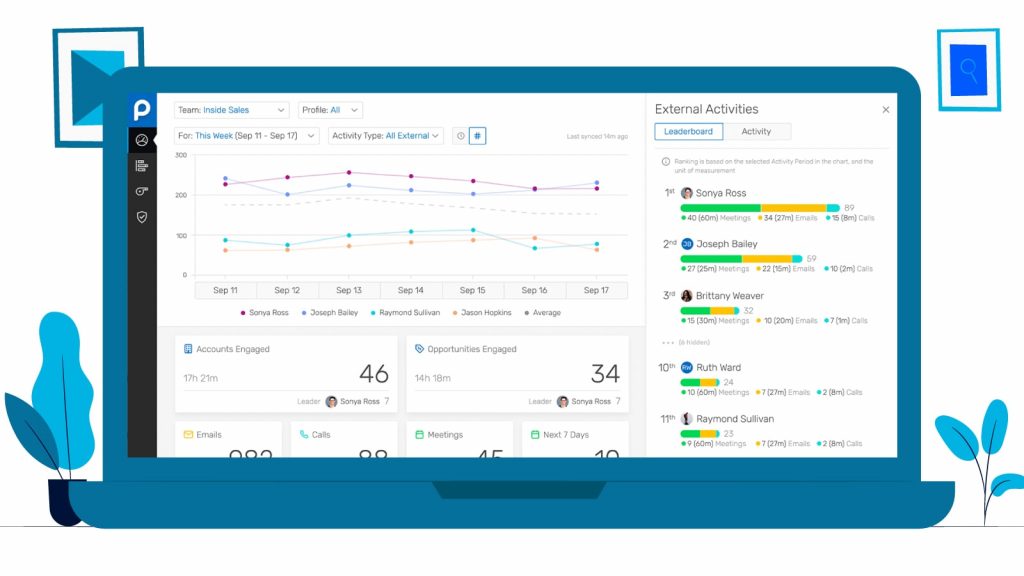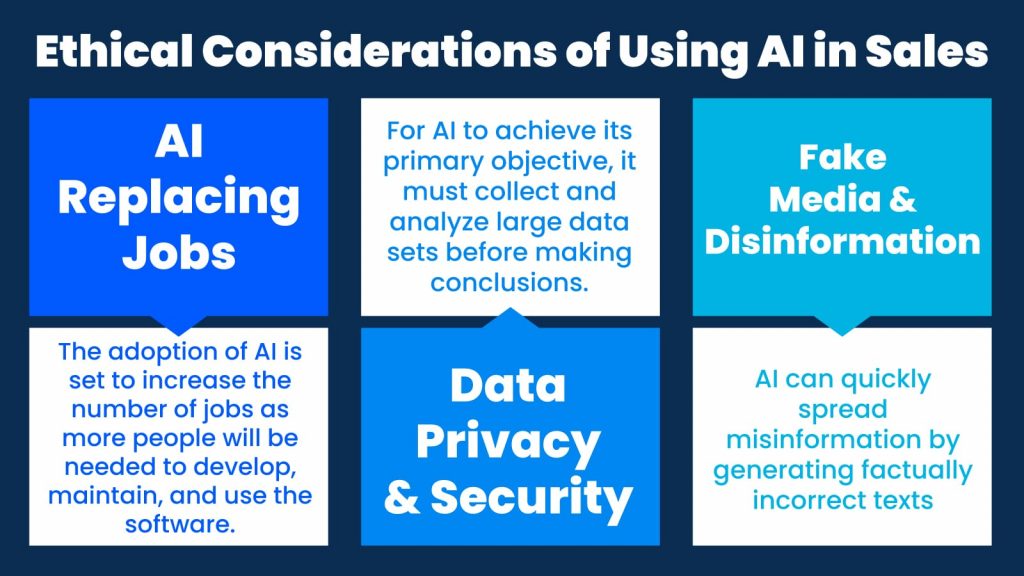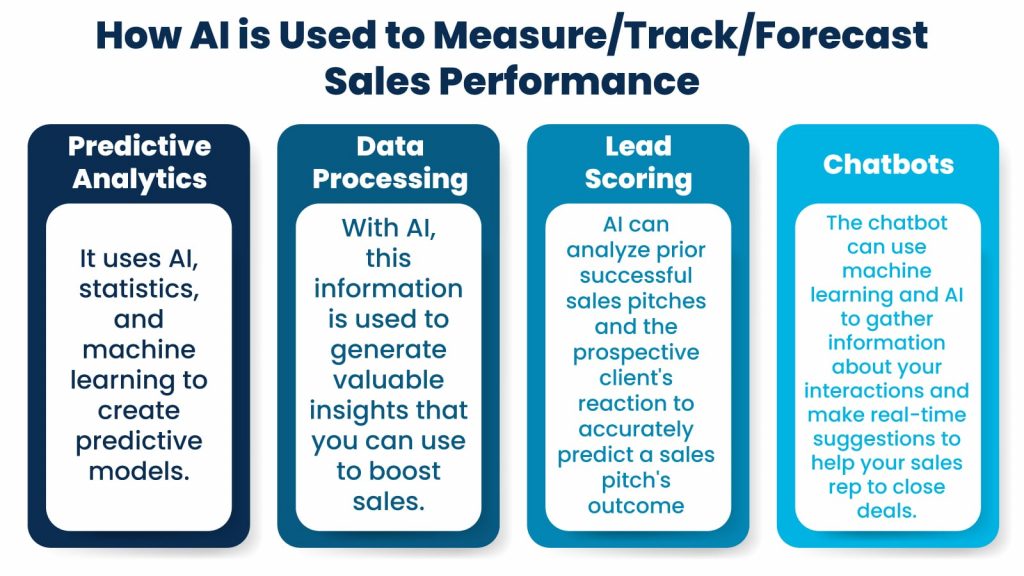While artificial intelligence (AI) as a field of study was born in 1956, it had always felt like AI needed a massive statement before it became widely accepted by the masses. That sweet spot moment looks like it came through with the launch of ChatGPT late last year by OpenAI.
And now, AI is all that everyone talks about.
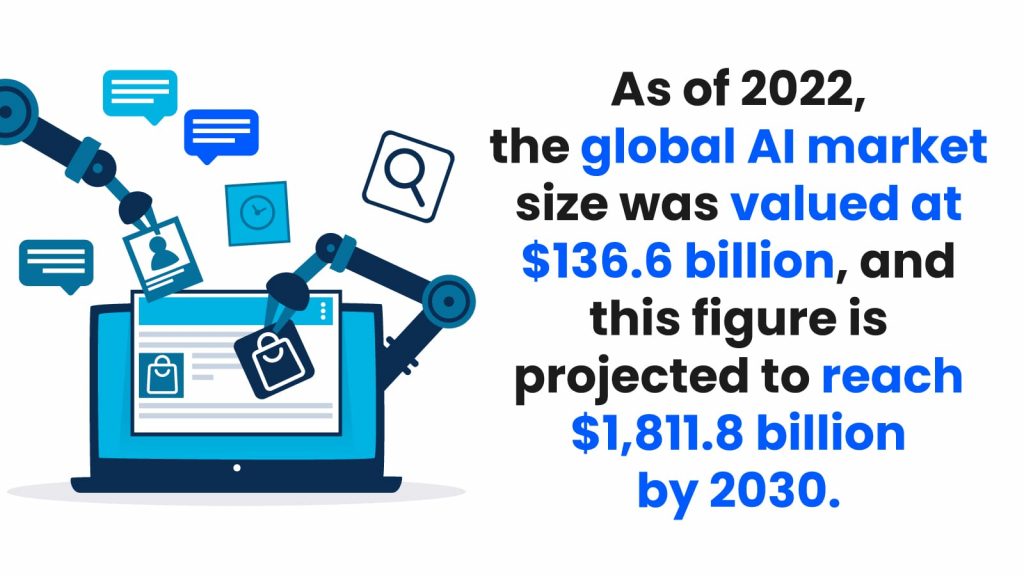
As of 2022, the global AI market size was valued at $136.6 billion, and this figure is projected to reach $1,811.8 billion by 2030.
AI is used in sales as a coach to help bridge the gap between your best sales reps and increase revenue.A common example of how AI is used in sales is how Netflix analyzes movies you watch and recommends.
This article will explore how AI can be used in sales; some use cases, and examples of companies that use AI. We will look at examples of AI tools you can use and how they can help you. We will also explore the risks and ethical concerns associated with adopting AI in sales and the challenges companies face when adopting these technologies. Finally, we will explore how AI will change sales in the future.
Read on to learn more about AI in sales and marketing, and how artificial intelligence will be used in to grow businesses in the future.

How Can AI Be Used In Sales?
Findings by Hubspot indicate that sales reps spend only 33% of their time actively selling. The rest of the time is inefficiently spent on data entry and other administrative tasks. This gap is where companies can leverage artificial intelligence to boost their sales and level up their operations.
Let us explore three ways AI is used in sales to improve performance below.
Personalization
AI personalization reshapes how brands interact with their customers. It uses machine learning to glean insights into customers’ demographics and interests to deliver optimal customer experiences. Thus, companies can provide tailored products and unique customer experiences.
Have you ever noticed how Amazon somehow knows what you want? Amazon uses AI-driven personalization to conduct predictive analytics before recommending items for you to buy.
Sales forecasting
Sales forecasting enables companies to stay afloat and remain competitive by predicting and adapting to changing consumer trends. Adopting AI sales forecasting software can massively improve the accuracy of sales forecasts for your company.
Alphabet Inc. uses AI in sales forecasting to analyze your data and provide insights into buying patterns and trends. This is how Google generates target ads.
Sales Coaching
AI sales coaching software allows you and your sales team instant access to analyze all your sales calls. This software provides audio and video call recordings to proactively identify weaknesses in sales pitches and improve your sales techniques.
Microsoft uses AI in its Dynamics 365 Sales Insights sales coaching tool to allow you to analyze customer interactions to improve your sales techniques.
What Are Some Use Cases of AI in Sales & Marketing?
Artificial intelligence is increasingly becoming an essential tool in sales and marketing. Read on to see the top use cases of AI in sales and marketing that we’ve compiled for you.
Lead Generation
Your sales rep team should spend most of their time closing deals rather than searching for potential customers. That is where AI comes in. According to a report by Everstring, 59% of B2B expect AI to help them identify potential customers. AI analyzes large amounts of data to identify patterns and trends that are used to target high-quality leads.
Lead Scoring
After generating high-quality leads, AI can help you to determine which of them are worth pursuing more accurately. AI analyzes the behavior of a consumer when they visit your page, how long they take, and the likelihood that they convert.
Sales Attribution
If your team has several marketing and sales reps, it is often difficult to accurately pinpoint who should get the credit for a sale.
AI-powered sales attribution enables you to give credit where it’s due. It also accurately analyzes data to determine the touch point that contributed more to the sale. That way, both teams know the sequence of activities that increase the chances of making a sale.
Sales Rep Response Suggestion
Artificial intelligence can provide real-time feedback to your sales rep and even pick up on subtle things like tone of voice during live conversations, making it easier for them to improve their sales techniques. It can also suggest responses.
What are the Risks of Using AI in Sales & Marketing?
A common risk associated with using AI in sales is that talent is in short supply and costly. Adopting AI requires a company to get talent who can operate the software and retrain the existing staff. This venture is not worth the hassle for small companies operating on a budget; this venture is not worth the hassle.
The amount of data required to develop AI predictive and prescriptive models for use in sales and marketing may be a hindrance. These models need you to use massive data sets to train the AI system, sometimes even on a scale of trillions of data points.
Using artificial intelligence in sales can result in unfair and discriminatory sales and marketing practices. In as much as AI removes human bias, if it is trained using biased data, the outcome will be AI built-in bias. For instance, you have probably heard that Amazon’s hiring AI system was biased against women after it was trained using biased data.
Moreover, no matter how advanced AI becomes, it still falls short of where it matters most; it lacks a human touch. AI chatbots still cannot hold complex conversations with customers to provide answers when queried.
What AI Sales Tools Are Available for Sales Teams?
The best AI sales tools should allow you to identify and predict buying patterns, assist with lead generation and scoring, and integrate with other tools, such as CRM software.
With so many choices, we have compiled five top-notch AI tools you should have.
Drift
Drift provides an AI-powered chatting platform where your sales, marketing, and customer service teams can easily interact with potential clients. It also ensures that high-quality leads get quickly connected to the right salesperson.
Gong
Gong removes the guesswork from sales calls. It uses AI to analyze your audio and video calls from sales calls. Then, it uses the successful ones to produce a blueprint for making your next call successful.
Node
Node is an excellent proprietary tool to have in your sales team. It uses artificial intelligence to generate high-quality leads. Additionally, it provides sales reps with suggestions on what to say to close more deals.
People.ai
People AI is a powerful sales software that helps reps automate data entry tasks, thus boosting productivity by ensuring that reps only focus on closing deals.
Crayon
Crayon is a powerful AI that you can use to learn what your competitors use to drive their sales. Crayon AI gathers data from a million sources and uses machine learning to provide valuable insights.
What are the ethical considerations around using AI in sales?
From what we have discussed so far, it’s clear that AI has a huge potential to boost sales. AI is used in sales to accurately create buyer personas and influence consumer behavior to generate more revenue.
However, according to an article by TechJury, only 35% of businesses had adopted artificial intelligence as of 2022. Does this number indicate a conservatory adoption rate driven by fear of opening Pandora’s box? Or is it due to the ethical risks that arise?
Let us look at the ethical risks of using AI in sales and marketing.
AI replacing jobs
So, is AI coming for your sales job? Well, the simple answer is No! The better answer is, Not Yet!
Currently, AI in sales functions more like an assistant. Here to help you with mundane tasks so that you can focus on making sales.
Positively, the adoption of AI is set to increase the number of jobs as more people will be needed to develop, maintain, and use the software.
Data privacy and security
For AI to achieve its primary objective, it must collect and analyze large data sets before making conclusions. This begs the question of how safe is the collected data. Is the data stored in a manner susceptible to cyber-attacks and data breaches?
Data privacy is also a substantial ethical concern, threatening our fundamental privacy rights. Nowadays, you cannot browse the internet or use a smartphone without something tracking your movements. To make it worse, the companies that collect this information are not transparent about sharing what they do with the data.
Fake media and disinformation
Misinformation is another huge ethical concern. AI can quickly spread misinformation by generating factually incorrect texts. Similarly, people can manipulate social media bots to spread hate speech and discord between companies and customers.
How Is AI Used In Measuring, Tracking & Forecasting Sales Performance?
As a sales manager, using sales forecasts to measure past performance to plan future inventory, operations, and strategy is crucial. The traditional sales forecast method is flawed and full of guesswork, as the sales cycle isn’t predictable.
AI is used in sales to make more accurate sales forecasts. It uses deep learning models to accurately assess relationships between several data metrics to identify emerging trends. Using this information, you can make a precise estimate of your total sales and expected profitability.
Let us look at how AI measures, tracks, and forecasts sales performance.
Predictive Analytics
Predictive analytics analyzes data and patterns before making predictions. It uses AI, statistics, and machine learning to create predictive models. These models establish relationships between data sets, such as previous sales cycles and macroeconomic factors.
If the correct data is used, it can predict future revenues with an accuracy of about 80%. Thus, helping you to make informed business decisions.
Data Processing
In general, companies collect a lot of data, some of which do not make sense to humans. Consequently, a lot of essential data gets ignored. With AI, this information is used to generate valuable insights that you can use to boost sales.
Lead Scoring
AI is used in sales to precisely score leads based on the probability of closing the deal. AI can analyze prior successful sales pitches and the prospective client’s reaction to accurately predict a sales pitch’s outcome. Sales reps can use this information to pay more attention to the best prospects and increase company revenue.
Chatbots
You can use AI chatbots to create a single platform where your sales and marketing teams can interact with potential clients. The chatbot can use machine learning and AI to gather information about your interactions and make real-time suggestions to help your sales rep to close deals.
How Will AI Change Sales in the Future?
AI adoption is still in its early stages; nevertheless, it is projected to grow at a tremendous CAGR of 38% from 2021 to 2030. If that’s not enough to show you the huge potential of AI, the global GDP is expected to grow by $15.7 trillion in that same period thanks to AI.
AI is already making significant contributions to sales. AI is used in sales to accurately predict sales forecasting, produce high-quality leads, prioritize leads, automate tasks, improve productivity, and make personalized recommendations.
We expect all these contributions to grow as AI advancement continues.
We expect AI-powered chatbots to improve as AI and machine learning models get trained on more data sets to hold complex communications with consumers 24/7.
Mark Hunter, CSP, the author of “High-Profit Prospecting,” predicts that AI will allow sales reps to handle and close more complex sales efficiently.
Fergal Glynn, a VP of Marketing at 6 River systems, predicts that AI personalization will empower sales reps with tailor-made information for their clients. They will make sales pitches full of confidence, knowing they have the required knowledge and sales techniques to close a deal with a specific client.
Final Thoughts
Adopting AI in your company can massively improve sales performance. AI is used in sales to promote productivity and increase revenues. Using AI to automate repetitive and administrative tasks allows sales reps to focus solely on selling more.
Artificial intelligence can grow your business by taking the guesswork out of core business concepts such as sales forecasting and lead generation.
Despite its benefits, using AI in sales has some ethical concerns that must be addressed. Customer data should be collected and stored according to set law regulations. Companies should also be more transparent with their consumers regarding how they use data to promote trust.

